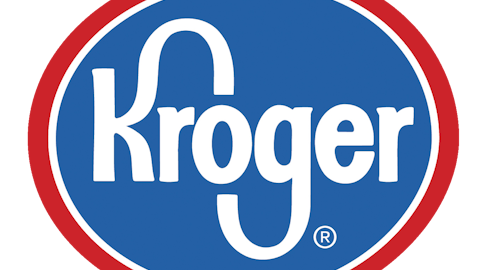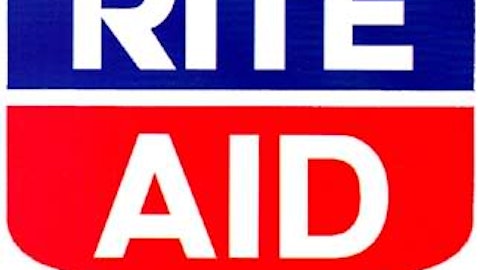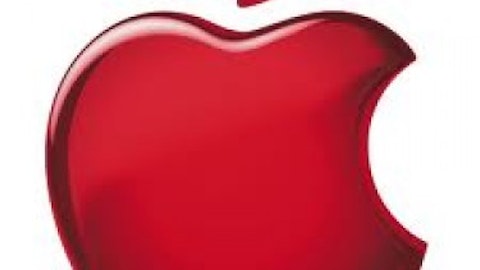Editor’s Note: This initial article stated that Supervalu owns the Shop ‘n Save chain; this is incorrect. Shop ‘n Save is locally owned and operated with Supervalu supplying the chain. This article has been corrected.
At one time, SUPERVALU INC. (NYSE:SVU) was one of the largest and most profitable grocery companies in the United States. However, as a result of stiff competition and bad economic conditions, the company’s sales have been declining for the past five years, and the company has been forced to divest a significant portion of its business in order to focus on returning to profitability and stabilizing its businesses. Will this once-great company succeed in returning to its former glory, or should investors get out while they still can?
About SUPERVALU
SUPERVALU INC. (NYSE:SVU) makes its money from three different business segments. Regional Food Operations, which contributed 28% of last year’s revenue has been downsized significantly (more on that later) with the number of grocery stores reduced from almost 1,100 to about 200. The company’s regional grocery stores are operated under the Cub Foods, Farm Fresh, Hornbacher’s, and Shoppers Food & Pharmacy names.
The reason for the downsizing was to allow the company to concentrate on the other two segments of its business. The Save-A-Lot stores segment operates almost 400 stores and licenses another 950. Save-A-Lot is a discount supermarket that is a no-frills which reduces costs wherever possible in order to offer the lowest prices on its grocery items. The stores even save on labor and shelving by displaying products directly in their shipping cartons. The stores have a limited assortment of products; generally carry only private label (store brand) products, and only one size.
The bulk of Supervalu’s business comes from its Supply Chain Services segment, which supplies a network of about 1,900 independent grocery retailers in addition to their own stores. The segment has several long-standing business relationships, such as with IGA, who SUPERVALU INC. (NYSE:SVU) has supplied for over 80 years.
Efforts to Bring Back Growth
Supervalu has taken steps over the past several years to divest underperforming businesses and close underperforming stores in order to bring profitability back to the company. Most notably, in March of this year, Supervalu sold 874 of its grocery stores, which included the Albertson’s, Acme, and Star Market brand names, for $3.3 billion to AB Acquisition. However, the deal only brought $100 million in cash for the company, with the other $3.2 billion in the form of assuming SUPERVALU INC. (NYSE:SVU) debt.
Threats and Alternatives
One of the main reasons for Supervalu’s decline is their inability to compete with large discount retailers such as Wal-Mart Stores, Inc. (NYSE:WMT), which has grown into the number one grocery business in the U.S. Wal-Mart has been the direct cause of some of SUPERVALU INC. (NYSE:SVU)’s stores underperforming.
Wal-Mart Stores, Inc. (NYSE:WMT) is a viable alternative to investing in a pure grocery play because it gives investors exposure to virtually every aspect of the retail sector. In addition, Wal-Mart is a stock that works in both good times and bad, due to its low prices and one-stop shop business model. Wal-Mart Stores, Inc. (NYSE:WMT) trades at a very reasonable valuation of 14.8 times TTM earnings, and pays a 2.5% dividend yield, which it has raised consistently over its history.
If you insist on a pure grocery play, a company like The Kroger Co. (NYSE:KR) may be the way to go. Kroger trades at an even lower valuation of just 12.5 times earnings, and the consensus calls for a 10% forward growth rate. While The Kroger Co. (NYSE:KR) is not able to fully price-match with Wal-Mart Stores, Inc. (NYSE:WMT), the company’s strategy has been to create such a good shopping experience for their customers that they simply don’t care about paying a little more. This strategy seems to be very effective, as The Kroger Co. (NYSE:KR) has grown its revenues every year over the past decade, including the economic crisis years of 2008-09. How many other companies can make that claim?
Valuation
It is tricky to analyze the value of a company with operating losses and declining earnings like Supervalu. At the same time of their recent sale of some of their stores, an investment group purchased 21.2% of SUPERVALU INC. (NYSE:SVU)’s outstanding shares for $4.00 per share through a new issuance by the company. Bear in mind, this was just a few months ago, and shares are 58% above that price level right now.
Buy, Sell, or Hold?
While Supervalu is projected to earn a small profit for the current fiscal year (2014) of 32 cents per share, I’m still hesitant to jump in until the company’s turnaround efforts begin to show real signs of working. As things stand right now, I really don’t see any reason for shares to be up by more than 50% over the past few months, and would need to see a pullback closer to the $4 range before taking a chance on this very speculative company.
Matthew Frankel has no position in any stocks mentioned. The Motley Fool owns shares of SUPERVALU INC. (NYSE:SVU).
The article Is This Speculative Grocery Company A “Super Value”? originally appeared on Fool.com.
Matthew is a member of The Motley Fool Blog Network — entries represent the personal opinion of the blogger and are not formally edited.
Copyright © 1995 – 2013 The Motley Fool, LLC. All rights reserved. The Motley Fool has a disclosure policy.





